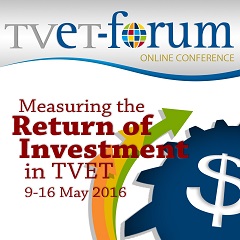
The UNESCO-UNEVOC International Centre: Who We Are | What We Do | Working With Us | Get in Touch
The UNEVOC Network: Learn About the Network | UNEVOC Network Directory
For Members: UNEVOC Centre Dashboard
Thematic Areas: Inclusion and Youth | Digital Transformation | Private Sector Engagement | SDGs and Greening TVET
Our Key Programmes & Projects: BILT: Bridging Innovation and Learning in TVET | Building TVET resilience | TVET Leadership Programme | WYSD: World Youth Skills Day
Past Activities: COVID-19 response | i-hubs project | TVET Global Forums | Virtual Conferences | YEM Knowledge Portal
Our Services & Resources: Publications | TVET Forum | TVET Country Profiles | TVETipedia Glossary | Innovative and Promising Practices | Toolkits for TVET Providers | Entrepreneurial Learning Guide
Events: Major TVET Events | UNEVOC Network News
20 May, 2016

Introduction | Messages | Participants
 From 9 to 16 May, 2016, UNESCO-UNEVOC organized a virtual conference on return on investment in technical and vocational education and training (TVET). The virtual conference, moderated by the National Centre for Vocational Education Research (NCVER) in Australia, informed the wider TVET community about a collaborative research project on ROI in TVET and was an opportunity for the community to share their ideas, expertise and experiences with the research team to strengthen and validate the initial bases for measuring ROI and identifying indicators.
From 9 to 16 May, 2016, UNESCO-UNEVOC organized a virtual conference on return on investment in technical and vocational education and training (TVET). The virtual conference, moderated by the National Centre for Vocational Education Research (NCVER) in Australia, informed the wider TVET community about a collaborative research project on ROI in TVET and was an opportunity for the community to share their ideas, expertise and experiences with the research team to strengthen and validate the initial bases for measuring ROI and identifying indicators.
The discussions focused on identifying the uses of ROI in TVET in different countries, as well as the data sources available to measure ROI. Importantly, the virtual conference also addressed the challenges in comparing ROI across different countries, and provided country specific insights into problems faced while collecting data. Here, the use of quantitative and qualitative methodologies was discussed extensively, as well as possible ways to overcome obstacles related to data collection.
Some key messages from the virtual conference include:
The 2030 Agenda for Sustainable Development![]() calls on Members States to “ensure inclusive and equitable quality education and promote lifelong learning opportunities for all” and sets a number of targets related to TVET. The vision encourages the education sector, of which TVET is an integral component, to contribute towards the transition towards equitable, inclusive and sustainable societies and economies, which consequently puts greater stress on, amongst others, the financing of TVET. The important role TVET plays in the fulfilment of the Sustainable Development Goals (SDGs) encourages governments and other stakeholders to explore the different types of benefits individuals, enterprises and governments obtain from investing in training.
calls on Members States to “ensure inclusive and equitable quality education and promote lifelong learning opportunities for all” and sets a number of targets related to TVET. The vision encourages the education sector, of which TVET is an integral component, to contribute towards the transition towards equitable, inclusive and sustainable societies and economies, which consequently puts greater stress on, amongst others, the financing of TVET. The important role TVET plays in the fulfilment of the Sustainable Development Goals (SDGs) encourages governments and other stakeholders to explore the different types of benefits individuals, enterprises and governments obtain from investing in training.
In this light, it is important for the TVET community to understand the returns from investing in TVET. The information is useful to governments as information on the performance of the TVET system, and provides justification for the public expenditure on TVET. It is also useful for enterprises to justify their expenditure on training, and individuals can use the information to inform themselves on the training choices that they make.